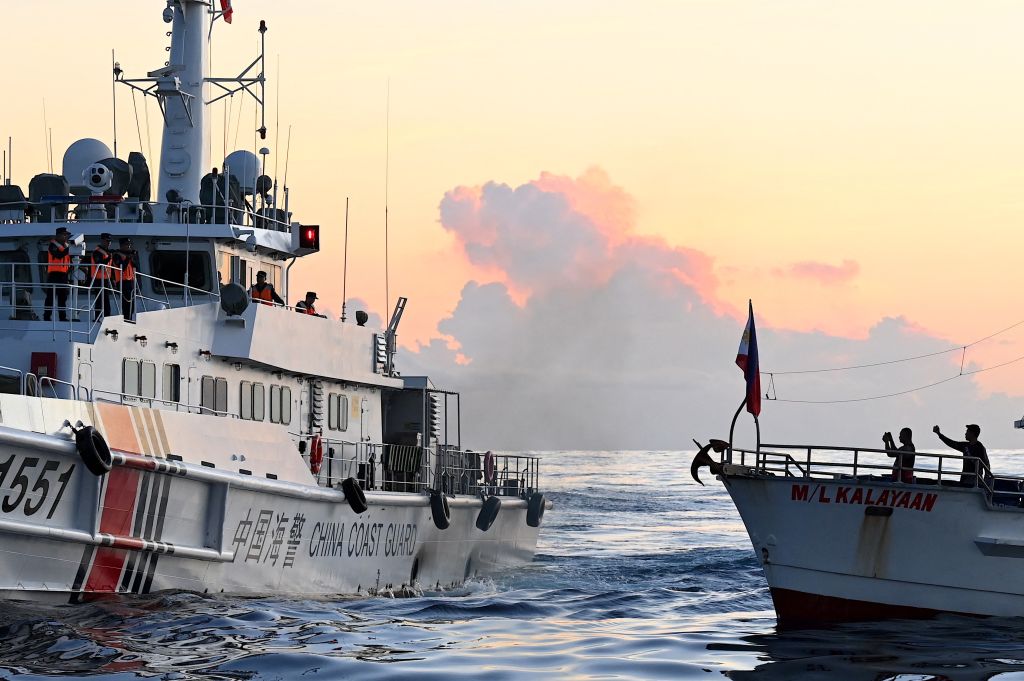Beijing’s strong-arming of the Philippines plays right into Washington’s hands
Posted By Greg Poling and Jude Blanchette on November 13, 2023 @ 11:00

On 22 October, two separate collisions took place near Second Thomas Shoal, an underwater feature that an international tribunal in 2016 ruled is part of the Philippines’ exclusive economic zone and continental shelf. A China Coast Guard ship rammed a much smaller civilian vessel contracted by the Philippine Navy to resupply troops stationed aboard BRP Sierra Madre.
In videos [1] released by both sides [2], the coastguard vessel can be seen blocking the path of the resupply ship, which attempted to evade it by crossing its bow and was struck. Separate videos [3] show the second collision. The Qiong Sansha Yu 00003, a professional maritime militia vessel operated by China’s state-owned Sansha Fisheries Development Company, pulled alongside and then collided with a stationary Philippine Coast Guard ship. The incident appeared to involve no serious damage, and a second Philippine resupply vessel managed to reach the Sierra Madre. But these were just the most dangerous interactions in a pattern of unsafe conduct that recurs monthly around Second Thomas Shoal.
The situation around Second Thomas highlights a key feature of China’s foreign policy—its refusal to acknowledge that the Philippines and other small states have their own agency in disputes with Beijing. This worldview was aptly summed up in a piece by the nationalist Global Times, which concludes [4]: ‘By escalating the tensions, the Philippines likely wants to draw support from the US, or the entire farce was staged by the US in the first place.’
When Chinese leaders confront a middle or small power that challenges or offends Beijing, they often accuse the smaller power of working in tandem with or being used by the US to drive an ‘anti-China’ strategy. This is the same sentiment with which Foreign Minister Yang Jiechi infamously shouted down [5] Singaporean counterpart George Yeo at the 2010 ASEAN Regional Forum. ‘China is a big country and other countries are small countries, and that’s just a fact,’ he said.
This sentiment is also the reason that Beijing sought to undermine the arbitration case brought by the Philippines in 2013 by insisting that it was engineered by the US and Japan. And it’s why after every Philippine diplomatic objection over the violence at Second Thomas, Chinese officials ignore the substance of the complaints and lecture their Filipino counterparts about being pawns in a US plot.
When another China Coast Guard vessel nearly collided with a Philippine ship in September, Beijing read from this familiar script. President Ferdinand Marcos Jr aired his frustrations at the annual ASEAN summit that same week, saying that [6] the Philippines rejected narratives of the South China Sea disputes that revolved around US–China competition. Marcos asserted, ‘This not only denies us our independence and our agency, but it also disregards our own legitimate interests.’
A month later, after the Philippines complained about another violent incident between itself and China, the Global Times ran an editorial cartoon [7] showing the Philippines as a stick being used by the US to stir up the South China Sea.
Beijing isn’t ready to acknowledge that Manila, or any other Southeast Asian claimant, has legitimate grievances that must be addressed to peacefully manage disputes. Beijing seems to believe that other states are less committed to their sovereignty and rights, defy China only because of American interference and will eventually buckle in the face of sustained pressure. Running the same coercive play over and over at Second Thomas Shoal seems unlikely to change Philippine policy and will only lead to further collisions and risk escalation.
There are two driving forces behind this aspect of China’s regional foreign policy: Beijing’s vision of regional hierarchy and its fear of US containment. In China’s long-embedded view of regional hierarchy, smaller states are historically and necessarily subservient to Beijing in the Asian pecking order. Long legacies of traditional tributary state relations with China, as well as the historical dominance of Chinese culture, language and economic power in the region, still linger in the minds of Beijing’s decision-makers.
Chinese leaders also genuinely see the US as an architect of a long-term containment strategy that seeks to undermine China’s regional influence—or worse, to bring about the collapse of the Chinese Communist Party. This view, which dates to the years just after the founding of the People’s Republic in 1949, now colours much of Beijing’s thinking about its external environment. As Chinese President Xi Jinping stated in March [8], ‘Western countries led by the United States have implemented all-around containment, encirclement and suppression of China, which has brought unprecedented severe challenges to our country’s development.’
Beijing’s unwillingness to treat the concerns and grievances of its regional neighbours as legitimate has now become one of the most prominent challenges to its management of external relations. As US officials admit privately, the Biden administration’s progress in strengthening relations with countries across the region, from Australia to India to the Philippines, is less a story of diplomatic acumen and more one of Chinese truculence. Should Beijing adjust course and begin treating regional actors as partners, not irritants, the Washington’s Indo-Pacific strategy may face its greatest challenge yet.
Article printed from The Strategist: https://www.aspistrategist.org.au
URL to article: https://www.aspistrategist.org.au/beijings-strong-arming-of-the-philippines-plays-right-into-washingtons-hands/
URLs in this post:
[1] videos: https://x.com/barnabychuck/status/1715948014576222230?s=20
[2] both sides: https://twitter.com/SCS_PI/status/1715979571110326395
[3] videos: https://twitter.com/jaytaryela/status/1716060726597648739
[4] which concludes: https://www.globaltimes.cn/page/202310/1300861.shtml
[5] shouted down: https://www.washingtonpost.com/wp-dyn/content/article/2010/07/29/AR2010072906416.html?sid=ST2010072906761
[6] saying that: https://scmp.com/week-asia/politics/article/3233749/south-china-sea-row-affects-philippine-interests-and-not-solely-us-china-issue-marcos-jnr-says
[7] editorial cartoon: https://globaltimes.cn/page/202310/1299373.shtml
[8] stated in March: https://www.theguardian.com/world/2023/mar/07/china-foreign-minister-warns-of-potential-for-conflict-with-us-and-hails-russia-ties
Click here to print.